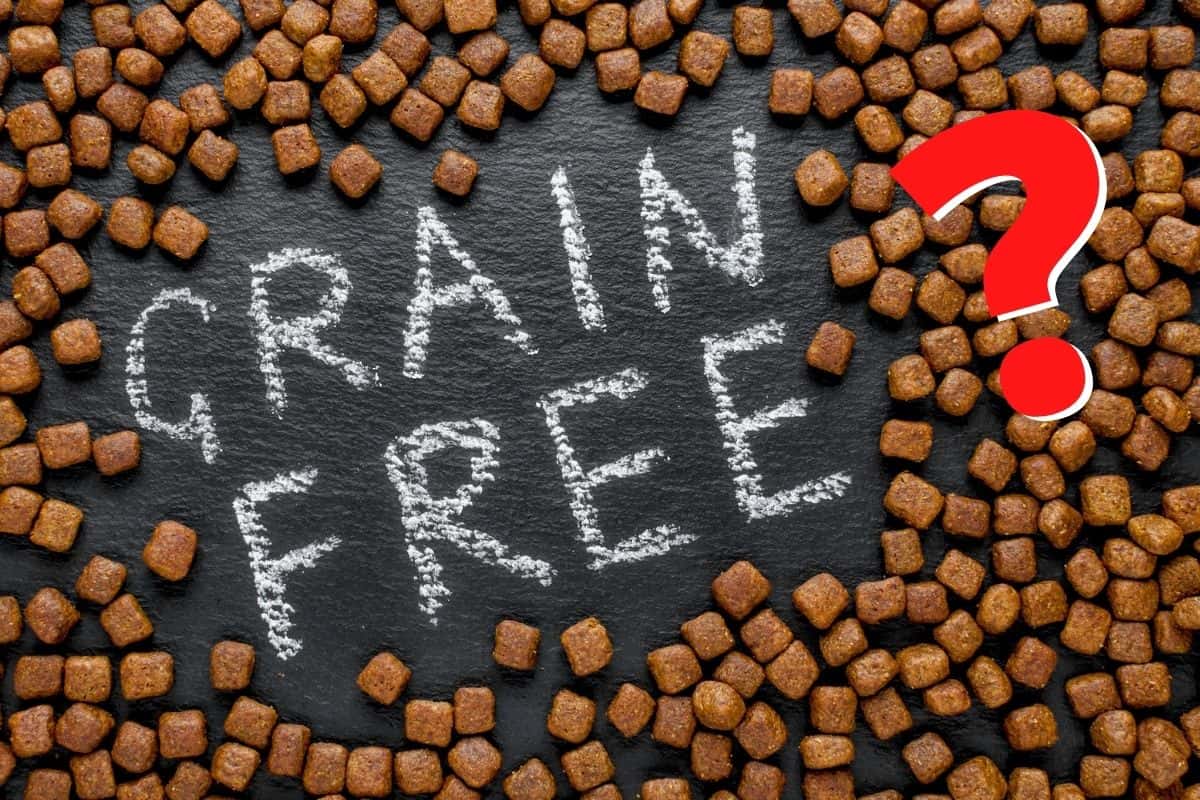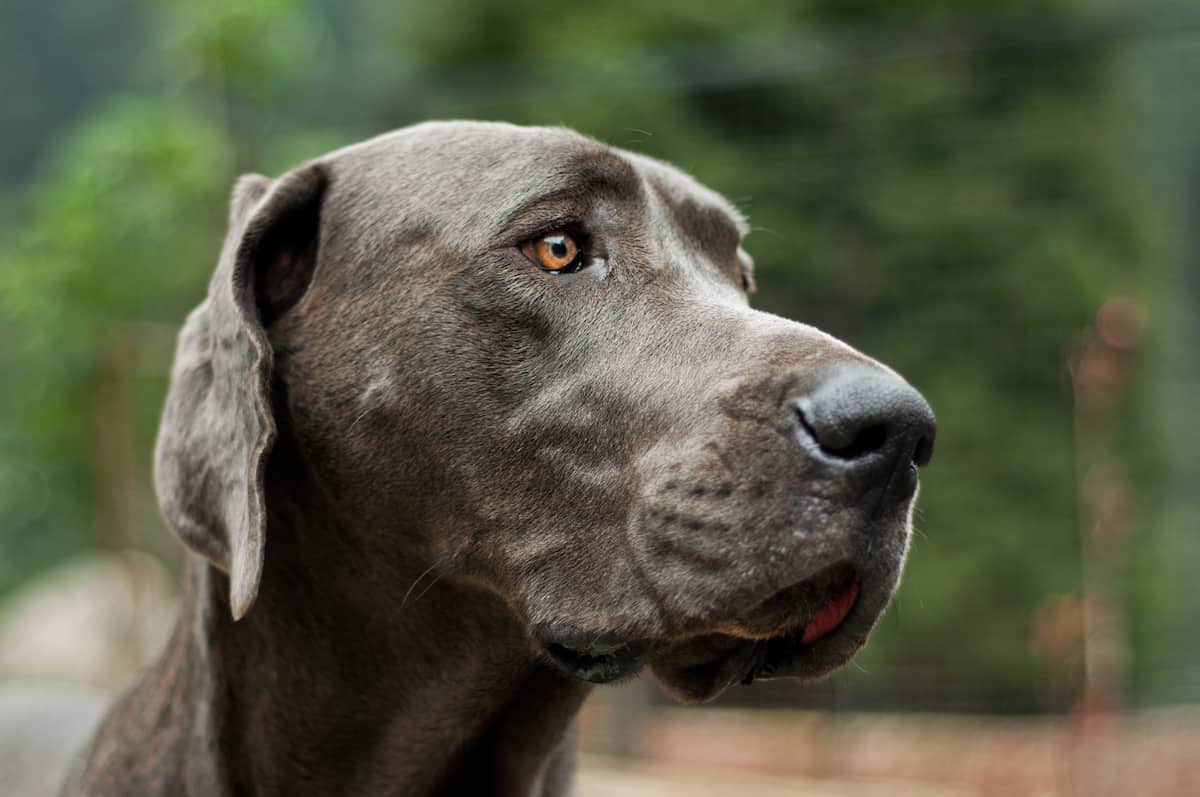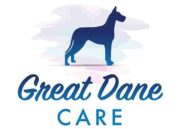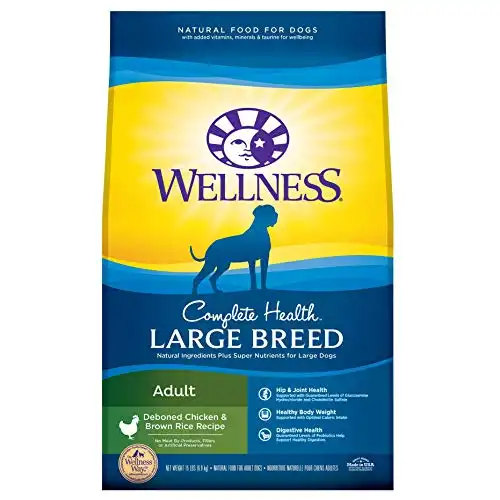
This post contains affiliate links and I will be compensated if you make a purchase after clicking on my links.
Are you looking for a diet for your Great Dane, or have you heard about the controversies with feeding your dog a grain-free diet? When looking for food, everyone wants their dog to eat the best possible food.
Recent studies have found that Great Danes should avoid a grain-free diet as it can lead to the development of Dilated Cardiomyopathy (DCM). Given that the breed is already predisposed to this condition, a grain-free diet should be avoided unless specifically directed by a veterinarian.
While this is the current general consensus, there are scenarios in which it may be appropriate for a Great Dane to consume a grain-free diet. Let’s dive into these scenarios as well as what issues a grain-free diet is related to.
Why Should Great Danes Not Eat Grain Free Foods?
In 2018 the FDA noticed an increasing trend in the number of reported cases for Dilated Cardiomyopathy, or “DCM” for short. Although DCM was a previously known condition, the sudden surge in new cases signaled that an outside factor was likely responsible and lead to the FDA opening an investigation into the matter.
While genetics certainly play a factor in predisposing animals to the condition, the spike was simply too large to ignore. Historically it has been seen to effect large and giant breeds to a larger degree, but these new cases affected a broad spectrum of breeds for which the condition was uncommon.
Out of all of the breeds in the study, Great Danes accounted for the fourth largest number of cases.
After digging into the data, it was found that 90% of the cases involved the feeding of a “grain-free” diet. Additionally, 93% of the products included peas and/or lentils.
In “grain-free” terms, this means that these foods did not contain any soy, wheat, rice, barley, corn, or other grains.
Thankfully, many of the dogs were able to make full or almost full recoveries after switching back to diets that included grains. So while the condition was reversible in many cases, the best option would be to simply avoid it in the first place!
While these cursory data points don’t paint a good picture for grain-free diets, this doesn’t mean that the sheer absence of grains was the sole factor.
Factors such as the overall quality of ingredients, presence and levels of amino acids such as taurine, and more will need to be further investigated before this case is a complete wrap.
Until that happens, it seems that avoiding a grain-free diet is a safer route for the vast majority of Great Danes.
What is Dilated Cardiomyopathy?
Much like humans, older Great Danes can suffer from heart disease. A common heart disease they get is Dilated Cardiomyopathy.
In simple terms, this means that the heart gets bigger.
Now when the heart enlarges, this causes its muscle walls to get thinner and no longer function properly.
Common signs associated with heart problems include:
- Coughing, especially after they have been outside playing
- Trouble breathing
- Falling over after bouts of energy
Your vet can listen to your Great Dane’s heart to see if they have a heart murmur. Your vet will also listen to their lungs since some heart diseases can also cause problems with your Great Danes lungs.
A heart murmur would indicate that there may be something wrong with your dog’s heart. If your Great Dane does have signs of heart disease, your vet may want to run tests on your dog’s heart.
The most common tests that your vet may suggest that you run are:
- Chest x rays
- Echocardiogram (an ultrasound of the heart)
- EKG
The test results will help your vet figure out how progressed their heart disease is. Once they figure out exactly what is wrong with your Great Dane’s heart, there are medications that your dog can be started on.
These medications will help your Great Dane’s heartbeat more effectively and decrease any fluid in the chest and abdomen.
When would a Great Dane Need to Eat a Grain-Free Diet?

While a grain-free diet shouldn’t be your de facto choice, it still has it’s place!
Dogs with veterinarian confirmed cases of grain sensitivity or allergies are prime candidates. However, the keywords here are “veterinarian confirmed” as true grain allergies are extremely rare in dogs.
Do NOT make assumptions around what your Great Dane is or is not allergic to on your own.
Sorry for not being sorry here, but any personal beliefs that you hold about the best diet for humans do not apply to canines (end rant).
What are the signs of food allergies?
Many of the signs of food allergies in Great Danes are seen as an allergic reaction to your dog’s skin. You may notice GI signs such as diarrhea and gas.
When a Great Dane is allergic to their food, there are many different symptoms that you may notice. These are some common signs seen in a dog with a food allergy.
Skin Rashes
The most common physical sign that you will see if your Great Dane has a food allergy is a rash on their skin. A skin reaction is when their skin becomes red and irritated. This is a mild form that causes a rash.
If your Great Dane has a skin rash, this does not mean that they have food allergies. This could also mean they touched or even inhaled, which is causing this reaction on their skin. In Great Danes with food allergies, the most commonplace to see skin rash is around their rectum.
Hair Loss
With more severe food allergies, this will cause hair loss. Many times, hair loss can be due to low-quality food. Hair loss can also be a sign of a much more severe disease as well.
Any time you notice hair loss in your Great Dane, it is recommended to have your dog examined by a vet, as some diseases can become life-threatening.
Ear Infection
Many food allergies cause your Great Dane’s ears to become inflamed and itch. When your Great Dane itches their ears, they are damaging the surface of the skin of their ears.
This can set up the perfect place for your Great Dane to develop an ear infection. Sometimes, these ear infections can be very painful. Even if you may have switched their diet to a diet for food allergies, your Great Dane may still need to see your vet get medication to treat the ear infection.
Diarrhea
If your Great Dane has a food allergy, they may also have diarrhea. The lining of their intestines becomes irritated and inflamed due to the allergen. This will cause their GI tract to be more motile, leading to diarrhea.
Many times, their diarrhea can easily be correct with a diet change and probiotics. Most Great Danes with diarrhea due to food allergies will still be very happy but will have a little abdominal discomfort.
Gas
If your Great Dane has a food allergy, it can cause them to have gas. This is because of the extra bacteria that may form in their GI system with the intestines become inflamed. Your Great Dane may have gas all the time. This can even cause your whole room to stink so much that you have to leave.
If you notice any signs, it is best for your Great Dane to see your vet. They can help see if these issues are due to food issues or if there is something more serious going on.
How do I test my dog for food allergies?
Unfortunately, there’s no easy way to test your Great Dane for food allergies. While they may be great communicators for dogs, getting feedback isn’t exactly the easiest from a canine patient!
Thankfully, there are two types of tests that can be administered to determine if your Great Dane has a good allergy.
- Blood test: There is a blood test that can be done to test your Great Dane for food allergies; these may not be the most accurate tests and can be quite expensive.
- Food Trial: If you do think that your Great Dane has food allergies, totally switching their diet to something different may stop all their problems. Any food trial should last at least six weeks before you decide that the food is what is causing your dog to have these allergies.
How can I help my Great Dane with allergies?
If you do think that your Great Dane does have a food allergy, the best thing to do is to take them to your vet. They can discuss all the different options for your Great Dane and help get them started on the correct treatment.
You can start a food trial at home. When at the pet store, look for a diet that is specific for a dog with food allergies or one that has a different protein source than your Great Dane is currently eating.
Can probiotics help my Great Dane with Food allergies?
Probiotics are great for Great Dane’s with allergies!
These can help rebalance the natural bacteria that live in your Great Dane’s digestive system. A dog who has food allergies will often have a disturbance of this bacteria, which causes gastrointestinal signs such as vomiting and diarrhea
What should my Great Dane eat?
When looking for dog food for your Great Dane, you will want to get the best dog food that you can find!
The best way to do this is to spend some time in the pet store looking at the back of the bag. This is where you will see a list of the ingredients in the food.
For an adult Great Dane, you want to find a dog food that contains good sources of protein, carb, and fats.
Protein
Proteins are an essential ingredient that you need for your Great Dane. One great source of proteins that you can feed to your Great Dane is lamb, chicken, fish, beef, or turkey. The muscles of these protein sources contain the best protein for your Great Dane.
It is best to feed your dog a protein source that is unprocessed. The processing methods of these foods can destroy the proteins, and your Great Dane will not get the full benefits of these proteins
Carbohydrates
All Great Danes need carbohydrates in their diets. These are very important ingredients in your dog’s diet to give your Great Dane the energy they need. When it comes to your Great Dane, you must be careful because there are many different types of carbohydrates.
Some Great Dane’s stomachs may have a very hard time processing some of the carbs, such as soy and corn. These are ingredients usually found in many of the inexpensive dog foods. When looking for food, find food with carbs that are easier to digests, such as sweet potatoes or brown rice
Fats
Your Great Dane will need to eat some fats. These fats will help your Great Dane have a very nice, shiny, and healthy coat. When trying to find dog food, fish oils are one of the best things that you can give your Great Dane for a healthy coat.
If you’re looking for a high-quality food for your Great Dane that meets all of this criteria, then I’d highly recommend taking a look at
This natural dry food is specially formulated to provide whole-body nutritional support for your large breed dog. It's designed to encourage a strong immune system, optimize energy levels and ensure a healthy skin and coat while promoting whole body health.
I highly recommend using Autoship with Chewy to save yourself an extra 5%!
Final Thoughts on Grain-Free Diets
While grain-free diets are not the best for a Great Dane, there are great brands of dog food that you can feed your Great Dane.
When looking for a good brand of food, spending some time looking at the different brands and picking out great food that helps keep your Great Dane full and healthy.
For a list of the top recommended Great Dane dog foods, make sure to take a look at my dedicated article on this topic.


In 93% of the heart issues peas and lentils were included. Why on earth would you advertise a food that has peas in the list of ingredients?